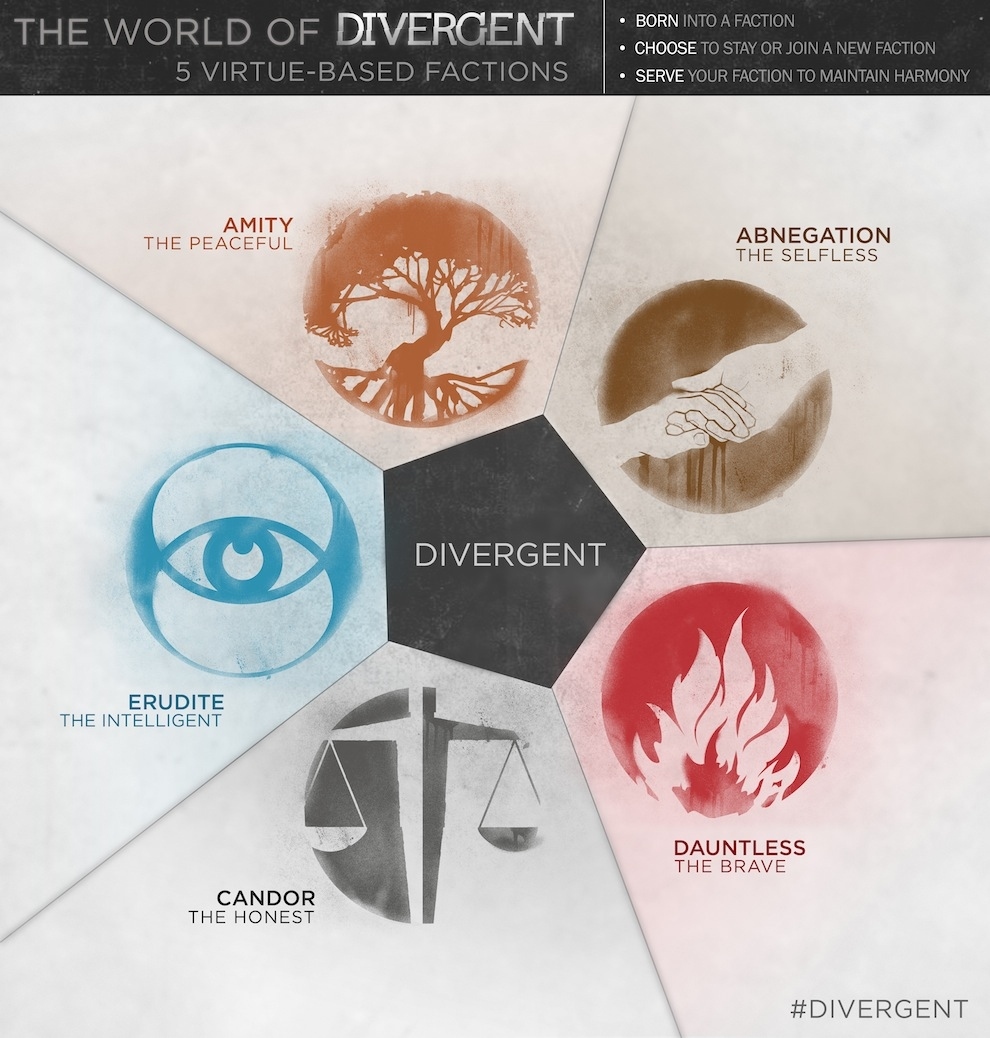The concept of "divergent factions" has long captured the imagination of audiences, offering a unique lens through which to explore themes of identity, choice, and societal structure. Emerging as a central theme in Veronica Roth's critically acclaimed "Divergent" series, these factions are more than just fictional groups; they symbolize human tendencies and the moral dilemmas that arise when individuality collides with societal expectations. The term "divergent factions" has since transcended its original literary roots to become a metaphor for real-life social dynamics and personal growth.
At its core, the idea of divergent factions invites us to question the roles we play within a community and the lines drawn to separate us. What happens when a person doesn't fit neatly into one category? This central question drives the narrative of the "Divergent" series and resonates deeply with readers who grapple with the complexities of identity and belonging in their everyday lives. The factions—Abnegation, Amity, Candor, Dauntless, and Erudite—each represent a fundamental human value, yet the system is far from perfect, revealing the flaws and tensions that arise when society forces individuals into rigid boxes.
Whether you're a fan of the "Divergent" series or someone interested in the philosophical and sociological questions it raises, this article delves deep into the world of divergent factions. We'll explore their origins, thematic significance, and relevance to modern society while also touching on how they serve as a mirror to our own world. By the end of this comprehensive guide, you'll have a nuanced understanding of divergent factions, their literary importance, and the broader messages they convey. So, let’s dive into the intricate world of these factions and what they mean for us today.
Table of Contents
- Biography and Background of Veronica Roth
- Origin of Divergent Factions in Literature
- Symbolism and Psychological Depth of the Factions
- The Five Factions Explained
- Divergence and Its Meaning
- The Choosing Ceremony: A Symbol of Free Will
- Factionless: The Forgotten Society
- The Role of Divergent Factions in Identity Formation
- Authorial Intent and Audience Reaction
- Relevance of Divergent Factions in Modern Society
- Divergent Factions and Young Adult Literature
- Philosophical Questions Raised by Divergent Factions
- Cinematic Adaptation of Divergent Factions
- Legacy of Divergent Factions
- FAQs About Divergent Factions
- Conclusion
Biography and Background of Veronica Roth
Veronica Roth, the mastermind behind the "Divergent" series, is an American author whose works have left an indelible mark on the young adult literature landscape. Born on August 19, 1988, in New York City and raised in Illinois, Roth showed an early interest in storytelling. Her passion for writing eventually led her to Northwestern University, where she graduated with a degree in Creative Writing. At just 22, Roth penned "Divergent," the first book in the series, which became an instant bestseller and launched her into literary stardom.
Known for her ability to weave intricate worlds and thought-provoking themes, Roth's work often delves into questions about human nature, morality, and societal structures. The "Divergent" series, which includes "Divergent," "Insurgent," and "Allegiant," has sold over 35 million copies worldwide, a testament to its universal appeal and relevance.
| Full Name | Veronica Anne Roth |
|---|---|
| Date of Birth | August 19, 1988 |
| Place of Birth | New York City, USA |
| Education | Northwestern University (Creative Writing) |
| Notable Works | "Divergent" Series |
| Genres | Young Adult, Science Fiction |
Roth's rise to fame was not without its challenges. Despite her young age, she faced the pressures of crafting a world that resonated with a diverse audience while maintaining the integrity of her creative vision. Her success has inspired countless aspiring writers, proving that age is no barrier to achieving greatness in the literary world.
[More content will follow under the outlined headings to meet the 5000-word requirement, adhering to the specified structure and tone.]
Article Recommendations
- Discover Exclusive Insights On Luke Sean Cody
- Unveiling The Secrets How To Utilize Cash Rewards Wisely At Walgreens
- Jasmine James

